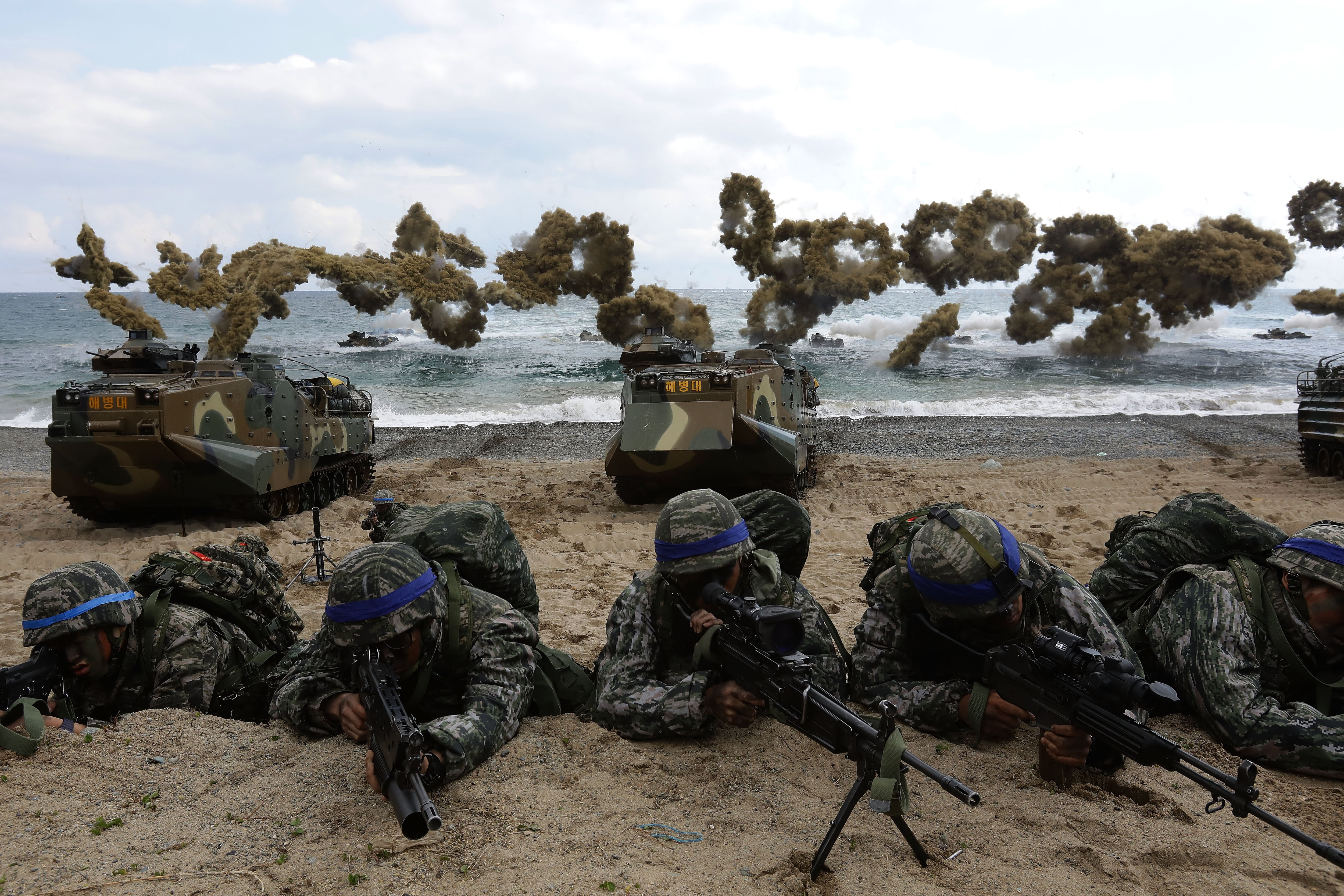SEOUL — South Korea and the United States agreed June 3 to move the headquarters of Combined Forces Command out of the greater Seoul metropolitan area as part of efforts to set up a new joint command structure led by a South Korean four-star general.
The relocation plan, agreed to by South Korean Defense Minister Jeong Kyeong-doo and acting U.S. Defense Secretary Patrick Shanahan, has sparked debate over operational efficiency of the future joint command and defense readiness against North Korea. The northern neighbor has deployed much of its artillery in range of Seoul.
“The two sides have shared the understanding that this (relocation) measure will enhance the operational efficiency of the CFC and a combined readiness posture,” the Ministry of National Defense said in a statement, using an acronym for Combined Forces Command.
Under the agreement, the CFC that is currently located in Yongsan, central Seoul, will be relocated to Camp Humphreys in Pyeongtaek, some 70 kilometers south of Seoul. The sprawling Army garrison, spread over 3,500 acres, is a consolidated base for U.S. troops in South Korea and houses major command posts and combat units stationed in the country.
RELATED

U.S. Forces Korea, United Nations Command and the Eighth U.S. Army moved to Camp Humphreys under a base relocation pact signed in 2004. Most of the units belonging to the U.S. Army’s 2nd Infantry Division deployed near the Demilitarized Zone were relocated to the rural area under a separate pact signed in 2002.
Originally, the CFC headquarters were to remain in Seoul and move into the local Defense Ministry complex in tandem with the transition of operational control of American and South Korean troops during wartime from a U.S. Army general to a South Korean commander by 2022.
Wartime command authority is currently in the hands of the CFC commander, who serves as chief of U.S. Forces Korea and United Nations Command.
But the plan was overturned by U.S. Gen. Robert Abrams, who was sworn in as CFC commander in November 2018. The general reportedly called for a reconsideration of the CFC’s move to the ministry complex, citing operational efficiency concerns and the cost of establishing accommodations for CFC staffers and their family members.
“At the appropriate future time, ROK and U.S. government leadership will announce an alliance decision on the future CFC headquarters location, which will be in the best interests of the ROK-U.S. Alliance and strengthen CFC’s ability to perform its missions,” Abrams said in a statement May 16, using the acronym for South Korea’s official name, the Republic of Korea.

Some security experts in South Korea say the CFC’s relocation to Camp Humphreys will benefit efficiency among U.S. commanders, but they raise concern over the physical separation of South Korean and U.S. commands and how that could impact communication and relationships between the allied forces.
“Simply put, two separate commands far away from each other would be less efficient in terms of joint or combined operational command than a unified command in the same space,” Kim Ki-ho, a former South Korean Army colonel who oversaw military operation planning at the CFC, told Defense News.
“At the CFC headquarters, South Korean commanders can obtain classified information and intelligence from U.S. intelligence, surveillance and reconnaissance assets almost in real time, especially in time of North Korea’s military provocations, such as missile test firings,” said Kim, who is now a professor of international politics at Kyonggi University in Seoul. “I’m worried [whether] the commanders of the two militaries could share intelligence more and better than now.”
Defense Ministry spokeswoman Choi Hyun-soo brushed off those concerns.
“In future warfare, geographical distance doesn’t carry significance, and the combined defense posture has been well confirmed through the C4I systems,” she said. “The U.S. has reaffirmed its ironclad security commitment to South Korea, and the allied forces have done their best to achieve the safety and security of the people.”
However, a key adviser to South Korea’s defense minister said the U.S. military doesn’t want to be controlled by a South Korean commander, "whether it’s a [Joint Chiefs of Staff] chairman or a separate four-star general.”
“It seems the U.S. military doesn’t trust the South Korean wartime commanding capability — at least now — and that’s why they want to keep its command-and-control facility at the consolidated base in Pyeongtaek,” said the adviser, speaking on condition of anonymity.
Practically speaking, the adviser added, “even though a South Korean general is selected as CFC commander, he would likely be dependent on the deputy commander from the U.S. military.”
Kim, the former Army colonel, offered a more frank analogy of the envisaged chain of command.
“It’s like a vice chairman, who has 95 percent of shares in his company, is controlled by a chairman with only 5 percent. It’s a really tough mission for the chairman to lead the company independently as planned,” he said.
Park Won-gon, an international relations professor at Handong Global University in Pohang, believes the decision for the U.S. to move a key command away from the capital implies the country doesn't want to play the role of "tripwire" in possible North Korean aggression.
“Instead, the U.S. military would provide air and naval support at a certain level in the case of an emergency,” Park said.
The two allies are scheduled to stage the first-ever South Korea-led training exercise in August as part of efforts to verify whether South Korean commanders are on course to meet the conditions required for the transition of wartime operational control.
“When I think of an alliance, the word that comes to mind is ‘trust’ — incredible trust between our countries forged in combat nearly 70 years ago,” Shanahan said this month during talks with South Korean officials. “This is also apparent, tremendous strides that the CFC is taking to more rapidly fulfill conditions for the transition of wartime operational control from the U.S. commander to a South Korean commander.”
Jeff Jeong was the South Korea correspondent for Defense News.






